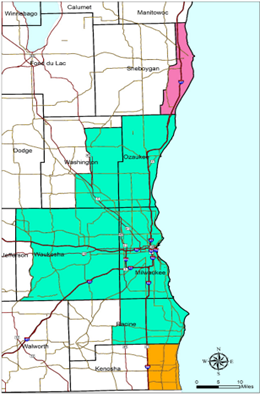
Unfair Air: Ozone Standard Reclassification Could Have Adverse Implications for Businesses in Southeastern Wisconsin
Unfair Air: Ozone Standard Reclassification Could Have Adverse Implications for Businesses in Southeastern Wisconsin
Authored By
Practices
Summary
The U.S. Environmental Protection Agency (EPA) plans to reclassify southeastern Wisconsin from moderate to serious nonattainment for ozone effective January 16, 2025. This may have important implications for businesses that emit volatile organic compounds and nitrogen oxide from manufacturing processes that are currently located or considering locating in this area of Wisconsin.
Background
The federal Clean Air Act imposes obligations on states and business located in those states where monitoring data demonstrates that the area is not meeting clean air standards for ozone. In particular, these restrictions are imposed for sources that emit volatile organic compounds (VOCs) or nitrogen oxide (NOX) that are the ingredients for the formation of ozone during warm weather months.
Areas located in Wisconsin have failed to meet the 2015 ozone standard. The areas subject to this nonattainment designation are depicted in the following map:
Despite monitoring data indicating a decline in VOC and NOX emissions in this corridor along Lake Michigan during this monitoring period, none of the nonattainment areas in Milwaukee, Sheboygan and Kenosha met the standard by the compliance date in 2024. As a result, the Clean Air Act requires the area to be “bumped up” from “moderate nonattainment” to “serious nonattainment,” a more restrictive designation. The impetus for this reclassification stems from the majority of these emissions originating in Illinois and Indiana and detected in air monitors in Wisconsin.
Impacts of the Bump Up for Businesses
The following consequences occur from this “Bump Up” that will impact major sources of VOCs or NOX emissions located in this nonattainment area:
- The major source threshold for VOC/NOX emissions for air permitting will decrease from 100 to 50 tons.
- Emission offset requirements for new major sources of such emissions or major modifications to existing sources increases from 1.15:1 to 1.2:1.
With these new thresholds, businesses located in this nonattainment area in Southeast Wisconsin with air permits should consider whether there is a need to adjust their current permit strategy resulting from the Bump Up. Some consideration may include:
- Evaluation of the need for a robust Title V operating permit.
- Apply for revised registration operation permit to adjust the synthetic minor limits for certain contaminants.
- Apply for a different type of Registration Operation Permit.
The Bump Up considerations for air permitting are quite complex. Hundreds of existing air permit sources located in the nonattainment area may soon be considered to be in noncompliance after this new, more stringent nonattainment status is effective.
It is recommended that businesses with air permits located in the ozone nonattainment area in Wisconsin should consult an air permitting professional as soon as possible to assess its compliance status and, if noncompliant, develop a strategy to attain compliance.
For more information on this topic, whether this change applies to your company, or other compliance questions, contact a member of our Environmental practice.



